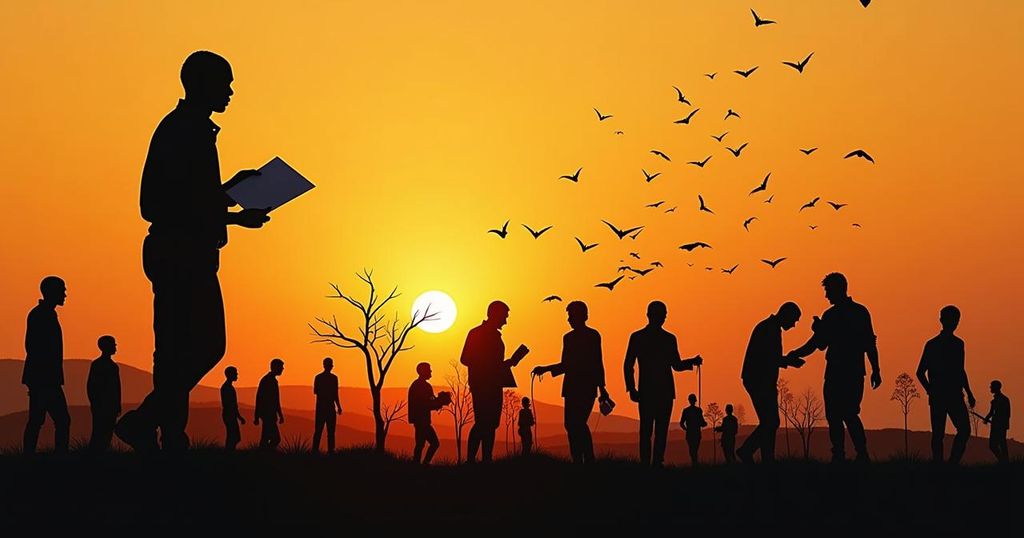Mozambique’s Critical Elections: Facing Insurgency and Hunger Challenges

Mozambique is set to hold critical elections on October 9, 2024, amid challenges such as a jihadist insurgency in Cabo Delgado and severe hunger caused by drought. With 17 million voters, candidates are focusing on promises to restore peace and address economic issues as they seek to succeed outgoing President Filipe Nyusi. The upcoming polls are shadowed by concerns over electoral integrity and past corruption scandals involving the ruling Frelimo party.
Mozambique is on the brink of pivotal elections, amid a complex backdrop of jihadist insurgency and severe hunger stemming from drought conditions. As 17 million citizens prepare to cast their ballots this week, they will choose a new president and fill 250 seats in parliament and provincial assemblies on Wednesday, October 9, 2024. Current President Filipe Nyusi is not eligible for re-election after serving two terms. The campaigns have focused heavily on addressing the ongoing violence associated with an insurgency in the northern province of Cabo Delgado, where ISIS-affiliated militants have wreaked havoc since 2017, leading to widespread displacement and destruction. Despite the candidates’ pledges to prioritize peace and development, concrete plans to combat the violence have not been clearly articulated. Candidates such as Daniel Chapo of the ruling Front for the Liberation of Mozambique (Frelimo), and independent contender Venacio Mondlane, have made addressing the conflict a cornerstone of their platforms. Chapo emphasized the need for peace, arguing that it would catalyze reconstruction efforts in Cabo Delgado. Meanwhile, Mondlane promised to eradicate kidnappings and insurgent violence within a year of taking office, resonating with an electorate distressed by years of turmoil. In addition to the insurgency, Mozambique is grappling with critical issues such as corruption and hunger, exacerbated by the adverse effects of El Niño, which has led to an estimated 1.3 million individuals facing severe food shortages. The ruling Frelimo party’s track record of corruption, particularly highlighted by the tuna bond scandal, has drawn scrutiny and disapproval among voters. Election observance will be conducted by the Southern African Development Community (SADC), which has dispatched a delegation to ensure a fair electoral process, especially following previous elections which were marred by allegations of fraud and violence. Political analysts express skepticism regarding the likelihood of a significant electoral upset against Frelimo, given its entrenched position in Mozambican politics, especially amid the ongoing conflict. Ultimately, the upcoming elections will represent a critical juncture for Mozambique as leaders will have to confront the dual crises of violence and poverty as they seek to guide the nation towards stability and growth.
The current political climate in Mozambique is significantly impacted by a jihadist insurgency that has plagued the northern province of Cabo Delgado since 2017. This conflict, which is linked to ISIS, has resulted in the deaths of thousands and the displacement of over 1.3 million people. The humanitarian crises have been compounded by severe droughts, driven by climate phenomena such as El Niño, leaving approximately 1.3 million citizens facing acute food shortages. Mozambicans are set to elect a new president, as the incumbent, Filipe Nyusi, is ineligible for a third term following two consecutive terms in office. The elections are crucial not just for national governance but also in determining how effectively the new leadership can tackle pressing issues of security, economic instability, and public health crises fueled by corruption and poverty. The ruling party Frelimo has been in power since independence in 1975, and public confidence in its ability to effect change is low, especially following scandals that have marred its image. Preparations for the elections are underway, with the SADC monitoring the process, raising concerns about fairness and transparency due to past electoral fraud allegations. Mozambique’s political landscape is thus characterized by a struggle for stability, with voters hoping for effective governance that prioritizes peace, development, and the alleviation of poverty amidst ongoing challenges.
The elections in Mozambique promise to be decisive as the nation grapples with deep-seated issues related to insurgent violence and economic hardships exacerbated by climate challenges. Candidates are attempting to connect with voters through promises of peace and recovery, but skepticism remains regarding their ability to deliver substantive change. The ruling Frelimo party’s longstanding governance and recent controversies may influence public sentiment as the process unfolds, with critical implications for Mozambique’s future stability and development.
Original Source: apnews.com






